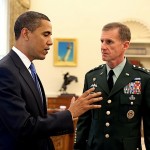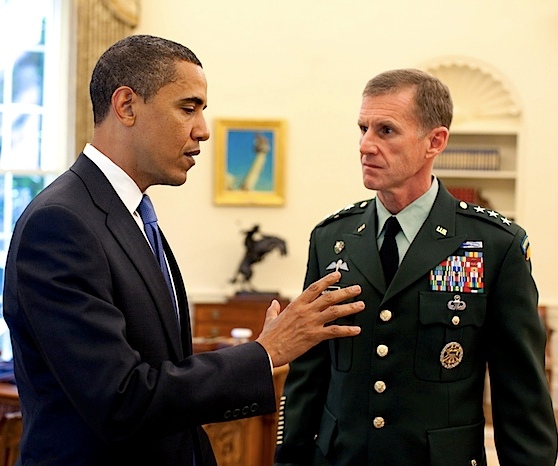Generals and Politics
 When President Obama was in Copenhagen, unwisely risking the prestige of the presidency on Chicago’s Olympics bid, he managed a hasty 25-minute meeting with General Stanley McChrystal, the U.S. commander in Afghanistan. McChrystal was in London at the time, unwisely speaking about U.S. strategy to the Institute for Strategic Studies.
When President Obama was in Copenhagen, unwisely risking the prestige of the presidency on Chicago’s Olympics bid, he managed a hasty 25-minute meeting with General Stanley McChrystal, the U.S. commander in Afghanistan. McChrystal was in London at the time, unwisely speaking about U.S. strategy to the Institute for Strategic Studies.
The purpose of the meeting on Air Force One in Denmark, which carried with it an implication of urgency, may have been for Obama to look McChrystal in the eye and say, “General, stop making public statements about strategic issues that I haven’t made a decision on. When I want your opinion, I’ll ask for it.” I don’t know if the President said anything like that, but he should have.
McChrystal crossed the line in London. Among other things, he reportedly used his speech “to reject calls for the war effort to be scaled down from defeating the Taliban insurgency to a narrower focus on hunting down Al Qaeda.” It’s not the job of military officers to publicly advocate their policy preferences, particularly in the midst of an ongoing decision making process.
Contrast McChrystal’s behavior with that of General David Petraeus, who publicly advocated the Iraq troop surge. The big difference is Petraeus did it with the approval of the president and defense secretary, who had already made their decisions, while McChrystal is apparently attempting to influence the President’s strategic decisions by going over his head and speaking out publicly.
There have been facile comparisons between this and the behavior of General Douglas MacArthur, who publicly challenged President Truman’s decisions on numerous occasions until Truman famously fired him. While this situation may seem similar, MacArthur occupied a singular place in military history, with fame and an independent political following that almost insulated him from the normal rules. No military officer since, and certainly not McChrystal, has had that kind of political power.
McChrystal is required by law and tradition to operate and offer opinions within his chain of command, which goes through General Petraeus and Secretary of Defense Robert Gates to the President. The only exception is if he’s called before Congress and specifically asked for his personal opinion, in which case he must give it.
What we don’t need now, of all things, is even the appearance of a break between the military establishment and the President. General McChrystal knows the rules, and he should follow them.
(This article was also published at Opinion Forum.)
Comments? Leave your intelligent feedback down below or consider following CollegeTimes on Facebook or Twitter to stay updated or to get in touch!

Please scroll down to leave a comment.
No Comments on “Generals and Politics” (RSS)